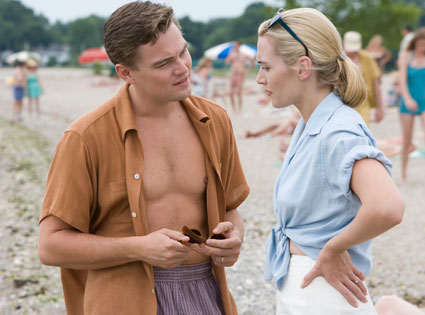'Revolutionary Road' and the critique of existentialism
 Revolutionary Road is the latest Sam Mendes offering set in suburban America. This time, he tackles the issues of happiness, freedom and their source, tracking the fortunes of married couple Frank and April Wheeler.
Revolutionary Road is the latest Sam Mendes offering set in suburban America. This time, he tackles the issues of happiness, freedom and their source, tracking the fortunes of married couple Frank and April Wheeler.
Frank and April are a young couple living in a model suburb (spot the similarities with American Beauty). April, played by Kate Winslet, is a failed actress and stay-at-home mother, whilst Frank, played by Leonardo DiCaprio, commutes daily to an office job in New York City.
The film picks Frank and April up as they have stalled into a rut of mundane life. Both characters feel as though they are just 'surviving': Frank in a job that he hates, April in a life she'd had never chosen minding her children. Suddenly, April gets the idea that their lives (and their marriage) can be reinvigorated if they move away from the 'comfort' of their home in Revolutionary Road and move to Paris. There she can work, whilst he works out what his vocation is. Frank eventually agrees to April's plan (he says that he, too, craves 'feeling, really feeling'), much to the consternation of their suburban friends.
Everything changes, though, when April becomes pregant, and a joke at work ends up giving Frank a chance at becoming a corporate hot-shot. With these changes, how will the Wheelers cope? April is driven by the prospects of freedom and true life - she's willing to abort and to carry on with the proposed emigration; Frank, meanwhile, prefers to numb the pain of his unfulfilment through staying busy, through material gain and through cigarettes and booze. The film essentially plays out this clash of worldviews and particularly critiques April's driven existentialism and demand for experiential fulfilment.
What's celebrated is April's zest for life: she longs for truth and a felt reality. She's willing to face up to the facts of her existence. She hates the emptiness and hopelessness of suburban life. She longs to make her life count and craves purpose, something endorsed by the fascinating character John, who has a psychiatric illness and speaks blunt truth. However, April's experience-driven choices are not shown in a completely positive light: she hurts many of those who are closest to her and treats them as objects for her gratification, she ignores her children and she makes some very dubious moral choices. In the end, the viewer can't help wondering whether her driven existentialism is irresponsible, selfish and ultimately unrealistic escapist (sentiments I've shared about existentialism before). But the only alternative given in the film is to ignore the voices that tell us that our lives don't count and numb the pain.
As a Christian, what is very obvious to me is that God is missing from the lives of the characters Revolutionary Road. The Bible speaks of a God who created humans in relationship with him and each other, of a God that judges - showing that lives matter, and a God who gives a purpose to his people. The Christian good news speaks to people like April who long authenticity, freedom and reality. It also speaks to people like Frank, encouraging them to face up to life as it really is, with all its hopelessness and emptiness. True freedom is found in offering all of one's life in joyful submission to Jesus, living life as it was created to be lived.


3 comments:
Finally got to see it. Really enjoyed it.
Your review reminded me of a conversation I had with someone on Sunday. There are two things that April and Frank have in common.
1. They both are seeking immediate experience - although of different kinds.
2. Neither is really capable of proper love. April loves the idea of Frank but not Frank as he is (the bit at the end with the napkin brought that out as she realised he is not what she imagined) and he loves her but wants to control and shape her.
Your sentence: 'The Bible speaks of a God who created humans in relationship with him and each other, of a God that judges - showing that lives matter' is dead right.
I didn't like this movie at all and would not recommend it to anyone else. It reminded me very much of "Who's Afraid of Virginia Wolf". It's very DEPRESSING.
Thanks Dave, that's insightful, especially your second point.
Charlene - yes, it is depressing worldview. I think it shows that we shrivel up with life away from God.
Post a Comment